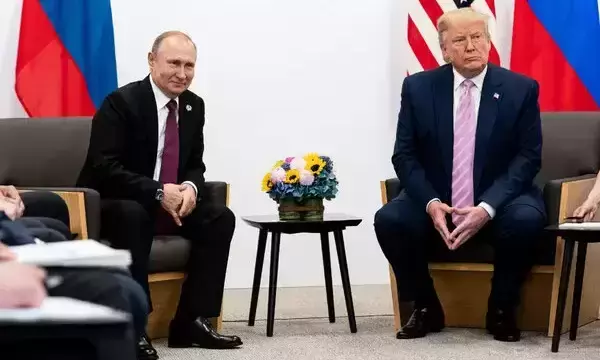
Trump to meet Putin in Alaska on Aug 15 to discuss ending Ukraine war
text_fieldsPresident Vladimir Putin of Russia and President Donald Trump during a bilateral meeting at the G20 Summit in Osaka, Japan, in 2019 | File image.
Washington: President Donald Trump announced on Friday that he will meet Russian President Vladimir Putin next Friday in Alaska to discuss ending the war in Ukraine, a move that could mark a significant diplomatic moment after weeks of his expressing frustration over the lack of progress toward halting the conflict.
Trump revealed the planned summit on social media, calling it “the highly anticipated meeting,” and said it would take place on August 15, with further details to follow. The Kremlin has not yet confirmed the specifics, though both Washington and Moscow had indicated that such a meeting could happen as soon as next week.
The war, which began more than three years ago when Russia invaded Ukraine, has claimed tens of thousands of lives. While the meeting could be pivotal, there is no guarantee it will end the fighting, as Moscow and Kyiv remain deeply divided over terms for peace.
Earlier in the day, Trump suggested that any eventual agreement would likely involve “some swapping of territories,” but provided no specifics. Some analysts, including figures close to the Kremlin, have speculated that Russia could be willing to relinquish control of certain areas outside the four regions it claims to have annexed.
Trump indicated the meeting with Putin would precede any talks involving Ukrainian President Volodymyr Zelenskyy, and said he was willing to meet the Russian leader even if Putin refused to meet Zelenskyy. This stance has alarmed European allies, who fear Ukraine could be sidelined in efforts to resolve the continent’s largest conflict since World War II.
Breaking with expectations that the summit would be held in a third country, Trump’s decision to host Putin on U.S. soil represents a symbolic gesture of legitimacy for the Russian leader, whom the United States and its allies have sought to isolate since the start of the war. The meeting in Alaska would be the first U.S.-Russia summit since 2021, when then-President Joe Biden met Putin in Geneva. Putin last visited the United States in 2015 for the United Nations General Assembly in New York.
Speaking to reporters earlier Friday at the White House, Trump refused to give the meeting’s exact time or place, citing security arrangements. He said the summit was delayed because “unfortunately people have to make” those arrangements, and expressed his belief that both Putin and Zelenskyy wanted peace. “Nothing easy,” Trump remarked, “but we’re gonna get some back, we’re gonna get some switched. There’ll be some swapping of territories, to the betterment of both.” He avoided calling it a “last chance” for peace, saying that once heavy fighting starts, “it’s awfully tough to get ’em to stop.”
Trump recently moved up his deadline to impose new sanctions on Russia and introduce secondary tariffs targeting countries that buy Russian oil, if the Kremlin failed to move toward a settlement. The deadline was Friday, but prior to announcing the meeting with Putin, his pressure campaign had not produced tangible results. The Kremlin’s larger forces continue to advance in Ukraine at significant cost, while shelling Ukrainian cities.
On the battlefield, Ukrainian troops remain engaged in intense fighting along the 1,000-kilometre front line. The Pokrovsk area in eastern Donetsk region is under heavy assault as Russia pushes toward the neighbouring Dnipropetrovsk region. Ukrainian forces also face intense clashes in the northern Sumy border region, where they are working to block Russian reinforcements from moving to Donetsk.
In Donetsk, a commander in Ukraine’s Spartan Brigade, using the call sign Buda, told The Associated Press, “It is impossible to negotiate with them. The only option is to defeat them.” In the southern Zaporizhzhia region, a howitzer commander known as Warsaw said, “We are on our land, we have no way out… we stand our ground, we have no choice.”
Meanwhile, the Kremlin reported that Putin spoke with Chinese leader Xi Jinping on Friday, briefing him on the results of a meeting earlier this week with Trump envoy Steve Witkoff. Xi reportedly expressed support for a long-term settlement to the conflict. Putin is expected to visit China next month. The U.S. has accused China, along with North Korea and Iran, of supplying military aid to Russia.
Indian Prime Minister Narendra Modi also spoke with Putin about the latest developments. This came after Trump signed an executive order imposing an additional 25 per cent tariff on India over its purchases of Russian oil, which he said was helping finance Moscow’s war.
Putin also held calls with leaders of South Africa, Kazakhstan, Uzbekistan, and Belarus. Sergei Markov, a pro-Kremlin analyst, interpreted the outreach as an effort to prepare Russia’s allies for a potential settlement with the United States. “It means that some sort of real peace agreement has been reached for the first time,” he said.
However, analysts at the Institute for the Study of War in Washington cautioned that “Putin remains uninterested in ending his war and is attempting to extract bilateral concessions from the United States without meaningfully engaging in a peace process.” The think tank concluded, “Putin continues to believe that time is on Russia’s side and that Russia can outlast Ukraine and the West.”
With PTI inputs






